Home Tags Posts tagged with "angela merkel"
angela merkel
Wolfgang Bosbach, a political ally of German Chancellor Angela Merkel, phoned her during a celebrity version of Who Wants To Be A Millionaire, hoping she could answer a question – but in vain.
Twice Wolfgang Bosbach called during RTL’s show, but all he got was the chancellor’s voicemail.
Thwarted by Angela Merkel’s silence he bowed out, winning 125,000 euros. The question was about an East German washing machine.
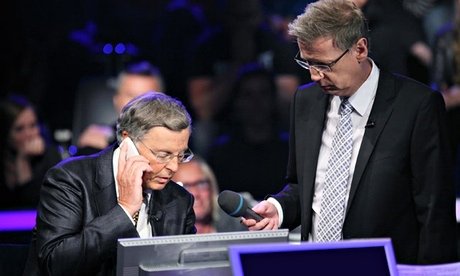
Wolfgang Bosbach phoned Angela Merkel during a celebrity version of Who Wants To Be A Millionaire
Angela Merkel grew up in the former communist East Germany.
Wolfgang Bosbach, a member of Angela Merkel’s conservative Christian Democrats (CDU), was asked why the East German WM66 washing machine was legendary.
The correct answer was that many owners also used it to stew fruit.
When asked if he wanted to phone a friend, Wolfgang Bosbach suggested the chancellor, explaining that “she’s always happy to see me and hear my voice”.
A correct answer from Angela Merkel would have won him 500,000 euros to spend on good causes.
At the end of the show he received a text back from Angela Merkel saying: “Ok whatever it was, warm greetings from am.”
Wolfgang Bosbach is currently deputy chairman of Angela Merkel’s CDU/CSU parliamentary group. He is a specialist in German domestic policy and legal affairs. He joined the CDU in 1972.
In her weekly podcast, German Chancellor Angela Merkel has proposed the creation of a European communications network to help improve data protection.
The network would avoid emails and other data automatically passing through the US.
Angela Merkel said she would raise the issue on Wednesday with French President Francois Hollande.
Revelations of mass surveillance by the US National Security Agency (NSA) have prompted huge concern in Europe.
Disclosures by Edward Snowden suggested even the mobile phones of US allies, such as Angela Merkel, had been monitored by American spies.
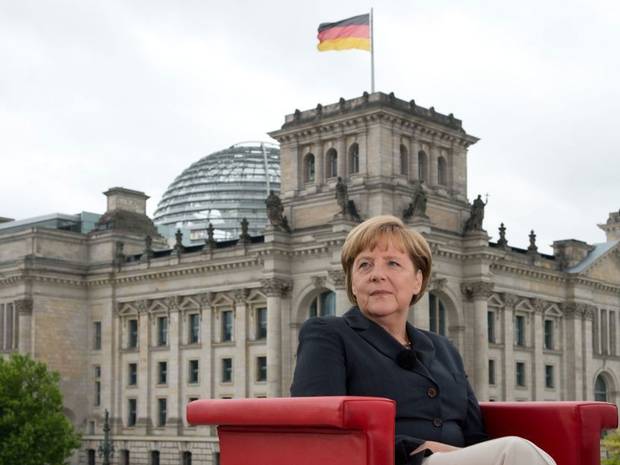
Angela Merkel has proposed the creation of a European communications network to help improve data protection
Classified NSA documents revealed that large amounts of personal data are collected from the internet by US and British surveillance.
Angela Merkel criticized the fact that Facebook and Google can be based in countries with low levels of data protection while carrying out business in nations that offer more rigorous safeguards.
“Above all, we’ll talk about European providers that offer security for our citizens, so that one shouldn’t have to send emails and other information across the Atlantic,” she said.
“Rather, one could build up a communication network inside Europe.”
There was no doubt that Europe had to do more in the realm of data protection, Angela Merkel said.
A French official was quoted by Reuters as saying that the government in Paris planned to take up the German initiative.
Germany has been trying to persuade Washington to agree to a “no-spy” agreement but without success.
[youtube ECCkqYZhqcU 650]
German Chancellor Angela Merkel has said a US official’s apparent insult of the EU’s efforts to mediate in the Ukraine crisis is “totally unacceptable”.
Assistant Secretary of State for European and Eurasian Affairs at the United States Department of State Victoria Nuland has apologized after a voice resembling hers used a graphic swear word in a conversation said to be with the US ambassador to Ukraine.
A recording of the apparently bugged conversation was posted online, with the US hinting at Russia’s involvement.
The EU and the US are involved in talks to end months of unrest in Ukraine.
After meeting Ukraine’s President Viktor Yanukovych in Kiev, Victoria Nuland said she would not make a public statement on the matter.
“I will not comment on a private diplomatic conversation,” she told reporters.
Mass anti-government protests erupted in Ukraine in late November after President Viktor Yanukovych refused to sign a far-reaching association and trade agreement with the EU – under heavy pressure from Moscow.

After meeting Ukraine’s President Viktor Yanukovych in Kiev, Victoria Nuland said she would not make a public statement on the matter
Russia has been widely accused of using its economic clout to persuade Viktor Yanukovych not to pursue closer ties with Brussels.
Russia has itself accused Washington and the EU of meddling in Ukraine.
German spokeswoman Christiane Wirtz said Angela Merkel fully supported the work EU policy chief Catherine Ashton had been doing to find a solution to the crisis.
“The chancellor finds these remarks totally unacceptable and wants to emphasize that Mrs. Ashton is doing an outstanding job,” Christiane Wirtz said.
The alleged conversation between Victoria Nuland and the US ambassador to Ukraine, Geoffrey Pyatt, appeared on YouTube on Thursday.
The 4min 10sec video was entitled “Maidan’s puppets” in Russian – a reference to the square in the Ukrainian capital, Kiev, where pro-EU protests have been held for months. A transcription of the whole conversation was also posted in Russian.
At one point, the female speaker mentions the UN and its attempts to find a solution to the Ukraine stand-off.
She says: “So that would be great, I think, to help glue this thing and have the UN help glue it and you know…” she then uses the swear word about the EU.
During an interview with a German television, President Barack Obama has said he will not let controversial NSA surveillance undermine Washington’s ties with Germany.
Speaking to Germany’s ZDF TV, Barack Obama indicated that US bugging of Chancellor Angela Merkel’s mobile phone had been a mistake and would not happen again.
After the row broke out last year, Angela Merkel accused the US of an unacceptable breach of trust.
On Friday, Barack Obama ordered curbs on how intelligence was being collected.
On Saturday, he told ZDF: “I don’t need and don’t want to harm that (US-German) relationship by a surveillance mechanism that somehow would impede the kind of communication and trust that we have.”
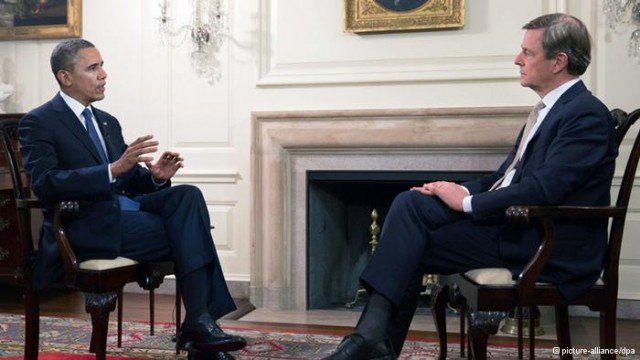
Speaking to Germany’s ZDF TV, Barack Obama indicated that US bugging of Chancellor Angela Merkel’s mobile phone had been a mistake and would not happen again
“As long as I’m president of the United States, the chancellor of Germany will not have to worry about this.”
Barack Obama added the US intelligence services, like all others, would continue to be interested in what world governments’ intentions were.
“There is no point in having an intelligence service if you are restricted to the things that you can read in the New York Times or Der Spiegel,” he said.
“The truth of the matter is that by definition the job of intelligence is to find out: Well, what are folks thinking? What are they doing?”
Barack Obama said he and Chancellor Angela Merkel might not always be of the same opinion but that was not a “reason to wiretap”.
The interview was broadcast a day after Barack Obama ordered restrictions on the use of bulk data collected by US intelligence agencies, saying civil liberties must be respected.
[youtube oT-PMEFg5C8 650]
German Chancellor Angela Merkel has made her first public appearance since fracturing her pelvis in a skiing accident.
Angela Merkel, 59, joined a group of children on Tuesday for a carol singing session. Although she was on crutches and limping slightly, Angela Merkel appeared to be in good spirits as she sang along.
The group of children were dressed in festive costumes and one young girl held up a song sheet for Angela Merkel to read from because she could not do so herself.
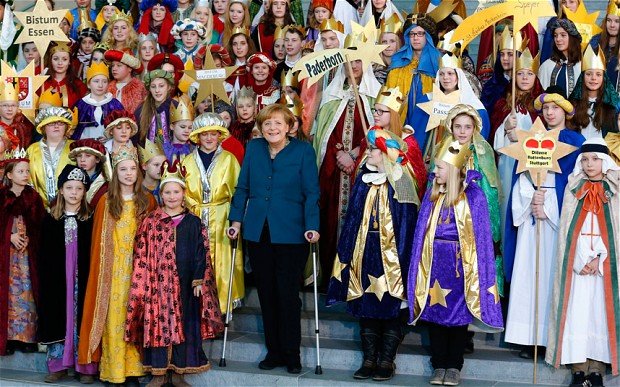
Angela Merkel has made her first public appearance since fracturing her pelvis in a skiing accident
Angela Merkel injured herself when she fell during a cross-country skiing accident in the alpine region in Engadin, Switzerland earlier this week.
On Monday government spokesman Steffen Seibert said that Chancellor Angela Merkel would be out of action for the next three weeks.
Steffen Seibert explained that Angela Merkel initially thought that she had suffered bruising but a doctor’s examination revealed a partial fracture to the left interior pelvic ring. She was told that the injury would require “lots of lying down”.
[youtube P5vamE3FCTM 650]
Angela Merkel has fractured a bone in her pelvis in a cross-country skiing accident in Switzerland, her spokesman says.
The German chancellor will have to remain lying down as much as possible in the next three weeks and several visits will be cancelled, Steffen Seibert said.
Angela Merkel also suffered severe bruising in the accident, in the Alpine Engadine region of eastern Switzerland.
She was not skiing fast at the time, the spokesman added.
He called the injury “severe bruising linked with a partial fracture on the left, rear part of the pelvis”.

Angela Merkel has fractured a bone in her pelvis in a cross-country skiing accident in Switzerland
Immediately after the accident, during the Christmas holiday in December, Angela Merkel was not aware that part of her pelvis had been fractured, the spokesman said.
He did not give details about how it happened. She was skiing near the resort of St Moritz.
Angela Merkel still intends to chair a cabinet meeting on Wednesday – the first gathering of all her coalition ministers. She is now walking with the aid of crutches.But mostly she will be working from home.
Angela Merkel has cancelled a trip to Poland this week and will not receive Luxembourg’s new PM Xavier Bettel in Berlin, the spokesman said.
New details of people and institutions targeted by the US and UK surveillance have been published by The Guardian, The New York Times and Der Spiegel.
The papers say that the list of around 1,000 targets includes a EU commissioner, humanitarian organizations and an Israeli PM.
The secret documents were leaked by Edward Snowden, now a fugitive in Russia.
They suggest over 60 countries were targets of the NSA and Britain’s GCHQ.
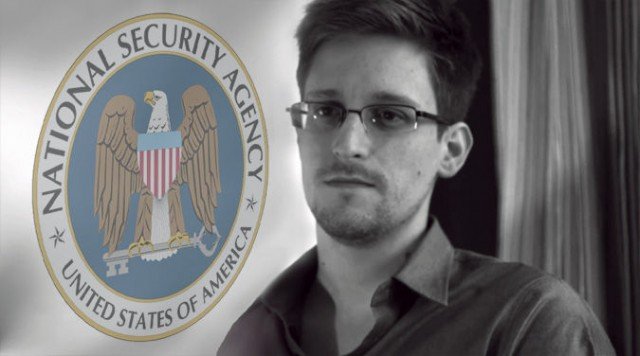
Edward Snowden left the US in late May, taking a large cache of top secret documents with him
The reports are likely to spark more international concern about the surveillance operations carried out by the US and the UK.
News that the National Security Agency (NSA) had monitored the phone of German Chancellor Angela Merkel triggered a diplomatic row between Berlin and Washington in October.
The New York Times that GCHQ monitored the communications of foreign leaders – including African heads of state and sometimes their family members – and directors of UN and other relief programmes.
The paper reports that the emails of Israeli officials were monitored, including one listed as “Israeli prime minister”. The PM at the time, 2009, was Ehud Olmert.
The Guardian wrote that GCHQ targeted the UN development programme, UNICEF, German government buildings and the EU Competition Commissioner, Joaquin Almunia.
German parliament (Bundestag) has confirmed Angela Merkel as the country’s chancellor for a third term, at the head of a grand coalition.
The coalition between her centre-right CDU/CSU bloc and the Social Democrats (SPD) has a huge majority, with 504 of the 631 seats in the lower house.
Angela Merkel was confirmed by 462 votes, with nine abstentions.
Germany’s tough stance on fiscal discipline is unlikely to change under the new coalition.
The SPD’s membership voted on Sunday to back the coalition after painstaking negotiations.
The party hammered out a minimum national wage, an hourly rate of 8.50 euros ($11.55) that will come into force for the first time in 2015.
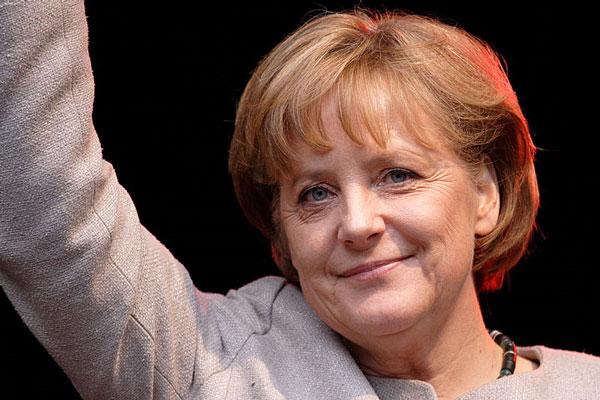
Bundestag has confirmed Angela Merkel as Germany’s chancellor for a third term
The new government will be slightly to the left of the previous one, in which the Christian Democrats/Christian Social Union were in coalition with the market-oriented Free Democrats (FDP).
But the SPD will form a minority part of the government and no-one doubts that Chancellor Angela Merkel will be in charge.
As the EU’s most industrialized and populous state, with its biggest economy, Germany dominates decision-making for the eurozone.
For Tuesday’s vote, 621 members of the Bundestag were present, of whom 150 voted against Angela Merkel.
Between them, the Left Party and the Greens have 127 seats, so at least 23 of those who rejected her nomination were from the parties making up the new coalition.
The coalition talks had been the longest for any German government since World War II.
The CDU/CSU and SPD finally signed the deal, a 185-page agreement entitled “Shaping Germany’s Future”, late last month.
Angela Merkel was obliged to turn to the SPD after the FDP failed to win any seats in the 22 September election, falling short of the 5% hurdle to enter the Bundestag.
Trusted Angela Merkel ally Wolfgang Schaeuble will remain finance minister in the new government, one of 10 CDU/CSU politicians in the 16-strong cabinet.
“His name stands for euro stability and I’m glad that he’s continuing,” Angela Merkel said after news of the new line-up emerged.
[youtube MmnG_ldx_CU 650]
Angela Merkel’s CDU/CSU has agreed terms for a coalition with the centre-left Social Democratic Party (SPD), German officials say.
The late-night deal follows talks by SPD leaders with Angela Merkel’s Christian Democrats (CDU) and allied CSU.
Chancellor Angela Merkel could be sworn in for a third term in office next month if SPD members ratify the deal.
The CDU/CSU fell short of a majority in September polls, and traditional coalition partner the FDP won no seats.
The breakthrough came after 17 hours of tense negotiations.
The final coalition deal will now go to a ballot of SPD members to be signed off, with the result expected in mid-December.
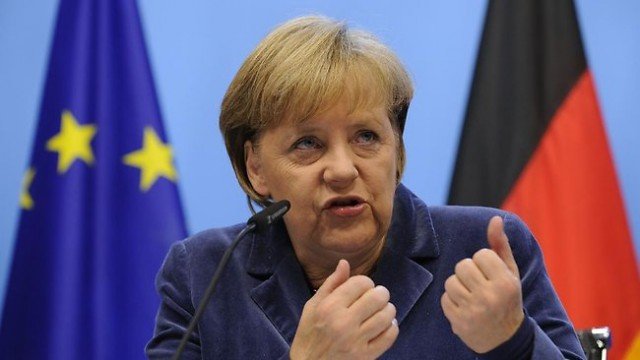
Chancellor Angela Merkel could be sworn in for a third term in office next month if SPD members ratify the deal
The German chancellor is expected to present the agreement alongside CSU leader Horst Seehofer and the SPD’s Sigmar Gabriel on Wednesday morning, though cabinet posts may not be announced until after the SPD vote.
Parties reached settlements on issues including a lower retirement age and changes to dual citizenship rules.
The SPD won a key demand for a nationwide minimum wage. An hourly minimum of 8.50 euros ($11.55) will come into force in the country for the first time in 2015.
The parties also agreed that there would be no tax increases, a key demand of the CDU/CSU.
“The work is done. It has been very intense and sometimes very hard work today but I think we have a result that is good for our country which is the main measure, but we can also say the result has a strong Conservative imprint,” said Hermann Groehe, CDU secretary general.
“No new taxes and no new debts.”
The SPD previously formed a grand coalition with the CDU/CSU in 2005-2009.
This time around, the partnership faces the twin tasks of rebalancing the eurozone’s biggest economy and winning the support of the German public to tackle the eurozone’s debt and banking problems.
At the election on 22 September, the CDU took about 41.5% of the vote, the SPD won 26%, the Greens 8.4%, and the former communist Left Party 8.6%.
Former German President Christian Wulff will go on trial today over receiving and granting favors in office.
Christian Wulff, 54, is alleged to have accepted the payment of hotel bills by a film producer in return for lobbying while he was premier of Lower Saxony in 2008.
The former president – who stepped down in February 2012 after less than two years in the post – is Germany’s first head of state to answer charges in court.
Christian Wulff rejects the allegations and has vowed to clear his name.
Film producer David Groenewold also faces similar charges.
The trial is expected to start at 10 a.m. local time in the northern city of Hannover.
Christian Wulff is alleged to have allowed film producer David Groenewold to pay hotel bills in Munich during the Oktoberfest beer festival in 2008 and on the northern island of Sylt in 2007.
In return, Christian Wulff is accused of having lobbied German companies to support David Groenewold’s work.
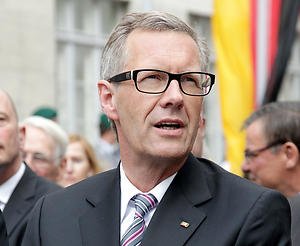
Christian Wulff is alleged to have accepted the payment of hotel bills by a film producer in return for lobbying while he was premier of Lower Saxony in 2008
Prosecutors had sought to put the former head on trial for corruption, but the court only approved the less serious charges.
If convicted, Christian Wulff faces up to three years in jail or a fine.
Christian Wulff and David Groenewold had rejected an offer from the prosecutor in March to settle the case with a fine – a procedure allowed for cases not considered especially serious.
He resigned amid a welter of unfavorable coverage in the German media dealing with his links to businessmen.
The pressure on him increased at the end of December 2011 with allegations, published in the mass circulation Bild newspaper, about a low interest home loan received from the wife of a wealthy businessman in 2008.
Christian Wulff was accused of giving misleading statements about the loan and later apologised to the editor of Bild, Kai Diekmann, for leaving an angry message on his voicemail threatening him if the story was published.
Chancellor Angela Merkel had pushed strongly to get Christian Wulff, from her centre-right CDU party, appointed to the largely ceremonial post in 2010.
At the time of his resignation, Angela Merkel said she accepted it “with respect but also with regret” and that she was convinced he had “acted legally”.
President Christian Wulff was succeeded by the Lutheran pastor and former East German anti-communist campaigner, Joachim Gauck.
Brazil and Germany have asked the UN General Assembly to adopt a draft resolution calling for the right to privacy in the digital age.
The draft calls for an end to excessive electronic surveillance, noting that the illegal collection of personal data “constitutes a highly intrusive act”.
Brazil and Germany have both been angered by allegations of large-scale US surveillance.
The allegations stem from revelations by NSA whistleblower Edward Snowden.
The draft resolution, which does not name individual countries, will be debated by a General Assembly committee focusing on human rights.
The draft calls on the 193-member assembly to declare that it is “deeply concerned at human rights violations and abuses that may result from the conduct of any surveillance of communications”.
This includes “extraterritorial surveillance of communications, their interception, as well as the collection of personal data, in particular massive surveillance, interception and data collection”.
The resolution, which will be voted on later this month, calls on all countries to protect the right to privacy guaranteed under international law.

The UN draft resolution follows allegations that the US has been eavesdropping on foreign leaders, including Brazilian President Dilma Rousseff and German Chancellor Angela Merkel
While General Assembly resolutions are non-binding, they can carry significant moral and political weight if they win enough support.
The draft follows allegations that the US has been eavesdropping on foreign leaders, including Brazilian President Dilma Rousseff and German Chancellor Angela Merkel, angering US allies in Europe and Asia.
Disclosures about the extent of US spying activity came from documents leaked to media organizations by Edward Snowden.
Angela Merkel’s anxiety about US spying overshadowed last week’s EU summit, when she remarked with irritation that spying on friends is “really not on”.
Dilma Rousseff was angered by revelations that the NSA had hacked the computer network of Brazil’s state-run oil company Petrobras to collect data on emails and telephone calls.
[youtube f3hPQGCO-eE 650]
Russia’s President Vladimir Putin has topped Forbes magazine’s World’s Most Powerful People list in 2013.
Vladimir Putin has beaten President Barack Obama into second place on the list.
Pope Francis features at number four after Chinese President Xi Jinping.
Barack Obama’s “lame duck period” had started earlier than usual while Vladimir Putin had consolidated his control of Russia, Forbes says.
German Chancellor Angela Merkel ranked number five – one of only two women to feature in the top 20.
British PM David Cameron is 11th most powerful, in the magazine’s opinion – well ahead of his French counterpart but well behind American philanthropist Bill Gates.
It is the first time in three years that Barack Obama has dropped to second place on the Forbes list.
It comes as relations between the US and Russia have been hit by the civil war in Syria.
Vladimir Putin, who has been dominating Russian politics for 12 years, was re-elected president in March 2012.
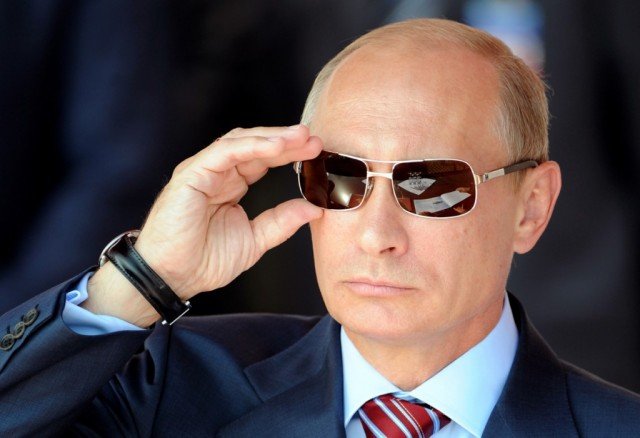
Vladimir Putin has topped Forbes magazine’s World’s Most Powerful People list in 2013
Barack Obama, on the other hand, has emerged bruised from a 16-day US government shutdown caused by a budget and debt crisis in Washington, Forbes says:
“Putin has solidified his control over Russia, while Obama’s lame duck period has seemingly set in earlier than usual for a two-term president – latest example: the government shutdown mess.”
Russia granted asylum in August to former NSA contractor Edward Snowden, who is wanted in the US over intelligence leaks.
A month later, Vladimir Putin “played the trump card again” by averting Barack Obama’s threatened missile strikes on Syria with a plan for Damascus to hand over chemical weapons, the magazine says.
“Anyone watching this year’s chess match over Syria and NSA leaks has a clear idea of the shifting individual power dynamics,” it adds.
Top 10 Most Powerful People – Forbes 2013
1. Vladimir Putin, Russian President
2. Barack Obama, US President
3. Xi Jinping, Chinese President
4. Pope Francis, Roman Catholic Church
5. Angela Merkel, German Chancellor
6. Bill Gates, co-chair, Bill & Melinda Gates Foundation
7. Ben Bernanke, Federal Reserve chairman
8. Abdullah bin Abdul Aziz Al Saud
9. Mario Draghi, European Central Bank president
10. Michael Duke, Wal-Mart CEO
[youtube jmS0uiWRvbs 650]
German intelligence officials are in Washington for talks at the White House on Wednesday following claims that the US monitored Chancellor Angela Merkel’s mobile phone.
Angela Merkel’s foreign policy adviser and Germany’s intelligence co-ordinator will hold talks at the White House.
The head of US intelligence has defended the monitoring of foreign leaders as a key goal of operations.
The US is facing growing anger over reports it spied on its allies abroad.
It has also been reported that the NSA monitored French diplomats in Washington and at the UN, and that it conducted surveillance on millions of French and Spanish telephone calls, among other operations against US allies.

German intelligence officials are in Washington for talks at the White House following claims that the US monitored Chancellor Angela Merkel’s mobile phone
However, NSA director General Keith Alexander said “the assertions… that NSA collected tens of millions of phone calls are completely false”.
The revelations stem from documents leaked by fugitive ex-US intelligence contractor Edward Snowden, who now lives in Russia and is wanted in the US in connection with the unauthorised disclosures.
German media have reported that the US bugged Chancellor Angela Merkel’s phone for more than a decade – and that the surveillance only ended a few months ago.
Germany’s delegation includes Christoph Heusgen, Angela Merkel’s foreign policy adviser, and Guenter Heiss, the secret service co-ordinator, said Caitlin Hayden, a spokeswoman for the US National Security Council.
US National Security Adviser Susan Rice, Director of National Intelligence James Clapper and Lisa Monaco, assistant to the president for homeland security and counterterrorism, are also expected to take part.
Caitlin Hayden said the meeting was part of the agreement reached between President Barack Obama and Chancellor Angela Merkel last week to deepen US-German cooperation on intelligence matters.
The meeting comes just hours after James Clapper and Gen. Keith Alexander testified before the intelligence panel of the House of Representatives on Tuesday.
Gen. Keith Alexander said much of the data cited by non-US news outlets was actually collected by European intelligence services and later shared with the NSA.
[youtube JDDIESu-6G4 650]
According to NSA officials, the chief of the US spy agency has not discussed the alleged bugging of German Chancellor Angela Merkel’s phone with President Barack Obama say.
General Keith Alexander never discussed alleged operations involving Angela Merkel, an NSA spokeswoman said.
German media say the US has been tapping Angela Merkel’s phone since 2002, and Barack Obama was told in 2010.
The row has led to the worst diplomatic crisis between the two countries in living memory.
A report in German tabloid Bild am Sonntag claimed that Gen. Keith Alexander had told Barack Obama about the bugging himself.

German media say the US has been tapping Angela Merkel’s phone since 2002, and Barack Obama was told in 2010
An NSA source told the paper that Barack Obama had not stopped the operation, and had wanted to know all about Angela Merkel as “he did not trust her”.
However, a statement from the NSA on Sunday denied the reports in Bild.
“[General] Alexander did not discuss with President Obama in 2010 an alleged foreign intelligence operation involving German Chancellor Merkel, nor has he ever discussed alleged operations involving Chancellor Merkel,” NSA spokeswoman Vanee Vines said.
“News reports claiming otherwise are not true.”
The statement does not make it clear whether the president was informed of the bugging operation by other means.
Barack Obama is reported to have told the German chancellor that he knew nothing of the operation when the two leaders spoke on Wednesday.
Germany is sending its top intelligence chiefs to Washington in the coming week to “push forward” an investigation into the spying allegations, which have caused outrage in Germany.
[youtube rGW0YPoy9Eg 650]
According to a report in German newspaper Der Spiegel, the US has been spying on Chancellor Angela Merkel’s mobile phone since 2002.
Der Spiegel claims to have seen secret documents from the National Security Agency (NSA) which show Angela Merkel’s number on a list dating from 2002 – before she became chancellor.
Angela Merkel’s number was still on a surveillance list in 2013.
Meanwhile Washington has seen a protest against the NSA’s spying programme.
Several thousand protesters marched to the US Capitol to demand a limit to the surveillance. Some of them held banners in support of the fugitive former contractor Edward Snowden, who revealed the extent of the NSA’s activities.
The nature of the monitoring of Angela Merkel’s mobile phone is not clear from the files, Der Spiegel says.

The US has been spying on Chancellor Angela Merkel’s mobile phone since 2002
For example, it is possible that the chancellor’s conversations were recorded, or that her contacts were simply assessed.
Germany is sending its top intelligence chiefs to Washington in the coming week to “push forward” an investigation into the spying allegations, which have caused outrage in Germany.
On Friday, Germany and France said they want the US to sign a no-spy deal by the end of the year.
As well as the bugging of Angela Merkel’s phone, there are claims the NSA has monitored millions of telephone calls made by German and French citizens.
The documents seen by Der Spiegel give further details of the NSA’s targeting of European governments.
A unit called Special Collection Services, based in the US embassy in Pariser Platz in Berlin, was responsible for monitoring communications in the German capital’s government quarter.
If the existence of listening stations in US embassies were known, there would be “severe damage for the US’s relations with a foreign government,” the documents said.
Similar units were based in around 80 locations worldwide, according to the documents seen by Der Spiegel, 19 of them in European cities.
The US government had a second German spy base in Frankfurt am Main, the magazine reports.
Angela Merkel phoned President Barack Obama when she first heard of the spying allegations on Wednesday.
Barack Obama promised Angela Merkel he knew nothing of the alleged phone monitoring, the magazine reports. The president apologized to the German chancellor, it said.
Angela Merkel – an Americophile who was awarded the US Presidential Medal of Freedom in 2011 – is said to be shocked that Washington may have engaged in the sort of spying she had to endure growing up in Communist East Germany.
[youtube GC-YPXXNMVU 650]
Germany is planning to send its top intelligence chiefs to Washington to “push forward” an investigation into allegations the US spied on Chancellor Angela Merkel.
The heads of German foreign and domestic intelligence would hold talks with the White House and the National Security Agency (NSA), a government spokesperson said.
Earlier, Germany and France said they want the US to sign a no-spy deal by the end of the year.
EU leaders at a Brussels summit have warned a lack of trust could harm the fight against terrorism.
As well as the bugging of Angela Merkel’s phone, there are claims the NSA has monitored millions of telephone calls by both German and French citizens.
Spain on Friday followed Germany and France in summoning the US ambassador to explain reports of spying on the country. Italy has also expressed anger at reports it too has been spied on.
US state department spokesperson Jen Psaki acknowledged that the revelations – most of them sourced to former NSA worker Edward Snowden – have “posed a moment of tension with some of our allies”.
“We are having discussions with those allies, those will continue, as is evidenced by the German delegation that will be coming here in the coming weeks,” she said.
Jen Psaki also said a review of US intelligence gathering, called for by President Barack Obama, would look at how it affects foreign policy.
The “high level group of outside experts… will consider as part of this how we can maintain the public’s trust, how the surveillance impacts our foreign policy, particularly in an age when more and more information is becoming public,” she said.
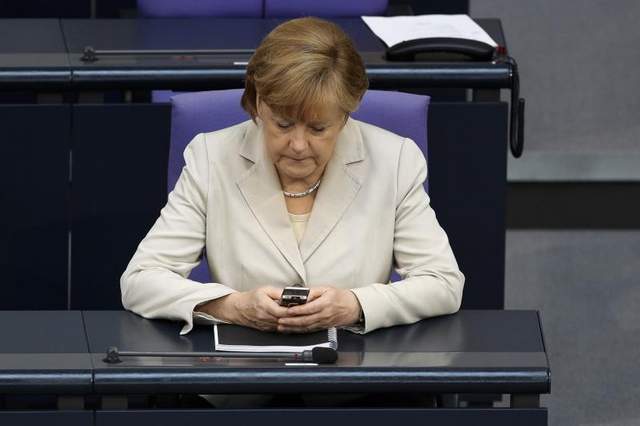
Germany will send its top intelligence chiefs to Washington to “push forward” an investigation into allegations the US spied on Angela Merkel
On Friday, the NSA website itself was inaccessible for several hours, with numerous hacking groups claiming credit for the service outage.
The issue was later put down to “an internal error that occurred during a scheduled update”, NSA spokeswoman Vanee Vines said.
“Claims that the outage was caused by a distributed denial of service attack are not true.”
German government spokesman Georg Streiter did not give a date for the intelligence chiefs’ trip to Washington but said it was being arranged with “relatively short notice”.
“What exactly is going to be regulated, how and in what form it will be negotiated and by whom, I cannot tell you right now,” Georg Streier told reporters.
“But you will learn about it in the near future because we have created some pressure to do this speedily.”
Angela Merkel made clear her anger at the allegations, which emerged in the German media, when she arrived in Brussels on Thursday for the EU summit.
The German chancellor told reporters after the first day that “once the seeds of mistrust have been shown it doesn’t facilitate our co-operation… it makes it more difficult”.
Angela Merkel said they would be pressing for a “joint understanding by the end of the year for the co-operation of the (intelligence) agencies between Germany and the US, and France and the US, to create a framework for the co-operation”.
At a news conference on Friday Angela Merkel said both Berlin and Paris would, separately, be pressing Washington for a deal that is “clear-cut, in line with the spirit of an alliance”.
French President Francois Hollande said the aim of the initiative “is about knowing about the past and setting a framework for the future and putting an end to monitoring mechanisms that are not controlled”.
Observers say they may be seeking an arrangement similar to the “Five Eyes” intelligence-sharing agreement the US has had with Britain, Australia, New Zealand and Canada since just after World War II.
A statement from EU leaders on Friday said the recent intelligence issues had raised “deep concerns” among European citizens.
The leaders “underlined the close relationship between Europe and the USA and the value of that partnership,” and “stressed that intelligence-gathering is a vital element in the fight against terrorism.”
But, the statement went on: “A lack of trust could prejudice the necessary cooperation in the field of intelligence-gathering.”
There are reports that the NSA has monitored the phones of 35 world leaders.
[youtube tAT3bUdwkJc 650]
[youtube kdhla03VGn8 650]
European leaders at the EU summit in Brussels say distrust of the US over spying could harm the fight against terrorism.
A statement agreed by the leaders says that “a lack of trust could prejudice” intelligence-gathering co-operation.
France and Germany are pushing for talks with the US to find a new “understanding” by the year’s end.
A number of allegations against US intelligence agents have surfaced this week, including the bugging of German Chancellor Angela Merkel’s phone.
In addition there have been claims that the US National Security Agency (NSA) monitored millions of French telephone calls.
On Thursday, the UK’s Guardian newspaper also reported that it had obtained a confidential memo from the NSA suggesting it had monitored the phones of 35 world leaders.
The latest revelations have been sourced to Edward Snowden, the former intelligence contractor who fled the country earlier this year and is now in Russia.
They have overshadowed other issues at the EU summit in Brussels, including the Mediterranean migration problem, which frames the agenda of Friday’s talks.
Italian authorities said they had intercepted some 800 migrants trying to cross the Mediterranean as the EU leaders prepared to meet.
The statement of heads of state or government, released on Friday, reflects the EU leaders’ conclusions following their talks on Thursday.
It says the recent intelligence issues had raised “deep concerns” among European citizens.
The statement says the leaders “underlined the close relationship between Europe and the USA and the value of that partnership”.
It continues: “[The leaders] stressed that intelligence-gathering is a vital element in the fight against terrorism.”

European leaders at the EU summit in Brussels say distrust of the US over spying could harm the fight against terrorism
And it went on: “A lack of trust could prejudice the necessary cooperation in the field of intelligence-gathering.”
Belgian PM Elio di Rupo said: “The objective must remain the same – to fight against terrorism but also respect privacy.
“Everyone can understand the need for exceptional measures given the danger of terrorism… but we are not in the position where we should spy on each other.”
Talks among the EU leaders had continued late into Thursday night.
Speaking afterwards, Angela Merkel said: “We need trust among allies and partners. Such trust now has to be built anew.
“The United States of America and Europe face common challenges. We are allies. But such an alliance can only be built on trust. That’s why I repeat again: spying among friends, that cannot be.”
Germany and France said they were proposing talks with the US to settle the row by the end of the year.
The leaders’ statement said: “The heads of state or government took note of the intention of France and Germany to seek bilateral talks with the USA with the aim of finding before the end of the year an understanding on mutual relations in that field.
“They noted that other EU countries are welcome to join this initiative.”
French President Francois Hollande said on Friday: “What is at stake is preserving our relations with the United States.”
EU President Herman Van Rompuy accepted the UK had “a special relationship” with the US, but said Britain was “completely on board with this text”.
UK PM David Cameron has yet to comment.
But a number of other leaders have indicated their support for the French and German position.
Finnish PM Jyrki Katainen said: “We have to talk together with the Americans, and try to find some sort of code of conduct [on] how to cooperate on this kind of issue in the future.”
Swedish PM Fredrik Reinfeldt said it was “completely unacceptable” to eavesdrop on the leader of an ally, a view echoed by Italian PM Enrico Letta, who added: “We want the truth.”
Other leaders signaled the need to move on.
Lithuanian President Dalia Grybauskaite said: “The main thing is that we look to the future. The trans-Atlantic partnership was, and is, important.”
Angela Merkel had raised her concerns with President Barack Obama in a call on Wednesday.
White House spokesman Jay Carney later said President Obama had assured Chancellor Angela Merkel that her phone was not being listened to now and would not be in the future.
However, his statement left open the question of whether calls had been listened to in the past.
[youtube bb1Z0E2ek3g 650]
John Emerson – the American ambassador in Berlin – has been summoned over claims that the US monitored German Chancellor Angela Merkel’s mobile phone.
German Foreign Minister Guido Westerwelle will meet John Emerson later in what is seen as an unusual step between close allies.
Angela Merkel has demanded a “complete explanation” of the claims, which are threatening to overshadow an EU summit.
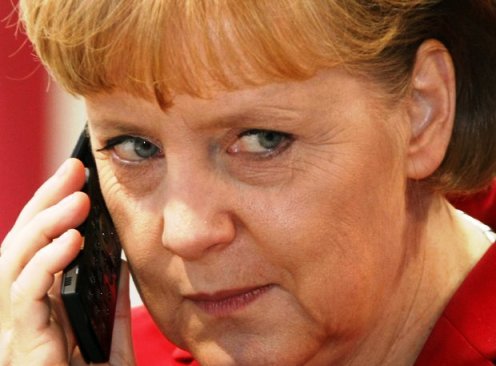
Germany has summoned the US ambassador in Berlin over claims that the US monitored Angela Merkel’s mobile phone
The German Chancellor discussed the issue with US President Barack Obama on Wednesday.
Barack Obama told Angela Merkel the US was not monitoring her calls and would not in future, the White House said.
However, it left open the question of whether calls had been listened to in the past.
French President Francois Hollande had already called for the issue to be put on the agenda of the summit – where EU leaders are due to discuss Europe’s digital economy, economic recovery and immigration – following reports that millions of French calls had been monitored.
[youtube PioDRYgF4bI 650]
The fresh allegations of US spying threaten to overshadow talks at an EU summit due to begin in Brussels.
The EU summit comes a day after German Chancellor Angela Merkel called President Barack Obama over claims that the US had monitored her mobile phone.
France’s President Francois Hollande is pressing for the issue to be put on the agenda following reports that millions of French calls had been monitored.
EU leaders will also discuss Europe’s economic recovery and immigration.
Some EU leaders are likely to want to use the summit to demand further clarification from Washington over the activities of its National Security Agency (NSA) in Europe.
The US is being called to account by its allies over allegations of spying based on material said to originate from NSA leaker Edward Snowden.
Angela Merkel says she wants US officials to clarify the extent of their surveillance in Germany.
Her spokesman said the German leader “views such practices… as completely unacceptable”.
Angela Merkel demanded an “immediate and comprehensive explanation”, said Steffen Seibert in a statement.
“Among close friends and partners, as the Federal Republic of Germany and the US have been for decades, there should be no such monitoring of the communications of a head of government,” the statement added.
A front-page commentary in Thursday’s Suddeutscher Zeitung – one of Germany’s most respected papers – refers to the “biggest affront”.
It says an attack on Angela Merkel’s mobile phone would be an attack on “her political heart”.
The White House said President Barack Obama had told Angela Merkel that the US was not monitoring her calls and would not in the future.

The EU summit comes a day after German Chancellor Angela Merkel called President Barack Obama over claims that the US had monitored her mobile phone
However, it left open the question of whether calls had been listened to in the past.
State-monitoring of phone calls has a particular resonance in Germany – Angela Merkel herself grew up in East Germany, where phone-tapping was pervasive.
In July, German media carried comments by Edward Snowden suggesting the NSA worked closely with Germany and other Western states on a “no questions asked” basis, monitoring Germans’ internet traffic, emails and phone calls.
“They [the NSA] are in bed with the Germans, just like with most other Western states,” Edward Snowden was quoted as saying by Der Spiegel magazine.
However, Angela Merkel denied any knowledge of the collaboration.
In June, Barack Obama assured Angela Merkel that German citizens were not being routinely spied upon. At the time, she was criticized by her political opponents for not being more skeptical.
Meanwhile, a major focus of the summit will be to boost the digital economy – seen as vital for growth.
With markets becalmed, Spain coming out of recession and Ireland soon to exit its bailout programme, there are signs of progress for Europe’s leaders to celebrate, says our correspondent.
One of the key initiatives of the European Commission is its Digital Agenda for Europe, which it says “aims to reboot Europe’s economy and help Europe’s citizens and businesses to get the most out of digital technologies”.
Council officials say investment in the digital economy is vital to boost growth. They want to address market fragmentation and a perceived shortage in IT skills.
They may also discuss telecoms reform, data protection and a cap on credit card payments.
The European Commission – which makes the rules – has recognized that it may have gone too far in some places.
President Jose Manuel Barroso says he wants the EU to be “big on big things and smaller on smaller things”.
He says the Commission has cut more than 5,000 legal acts in the past five years and wants to do more.
On Friday the leaders will discuss relations with central European countries, ahead of a November summit at which new agreements will be signed.
Migration will also be discussed, following the loss of hundreds of lives among migrants trying to reach Europe from Africa and the Middle East.
The commission has called on EU countries to offer “additional and urgent contributions” to prevent further tragedies at sea.
It wants greater resources to survey and patrol sea routes, but also a more co-ordinated approach to dealing with migrants.
Countries on the Mediterranean coast deal with sudden and unmanageable mass arrivals, but the countries which approve most asylum requests are Germany, France and Sweden.
The commission wants a more even resettlement of refugees.
EU sources say the leaders are likely to promise improved co-operation, but not more money or resources. They say they first want a new surveillance effort, Eurosur, to come into force, to see what effect it has.
[youtube 8Myal_F1Ifo 650]
Angela Merkel has called President Barack Obama after receiving information that the US may have spied on her mobile phone.
A spokesman for Angela Merkel said the German Chancellor “views such practices… as completely unacceptable”.
Angela Merkel has called on US officials to clarify the extent of their surveillance in Germany.
The White House said President Barack Obama had told Chancellor Merkel the US was not snooping on her communications.
“The United States is not monitoring and will not monitor the communications of the chancellor,” White House spokesman Jay Carney said.

Angela Merkel has called President Barack Obama after receiving information that the US may have spied on her mobile phone
Jay Carney told reporters that Washington was examining concerns from Germany as well as France and other American allies over US intelligence practices.
The call comes a day after US intelligence chief James Clapper denied reports that American spies had recorded data from 70 million phone calls in France in a single 30-day period.
James Clapper said a report in Le Monde newspaper contained “misleading information”.
The German government would not elaborate over how it gained its information about alleged US spying on its leader’s communications.
German news magazine Der Spiegel, which has published stories based on material from NSA leaker Edward Snowden, said the information had come from its investigations.
Berlin demanded “an immediate and comprehensive explanation” from Washington about what it said “would be a serious breach of trust”.
“Among close friends and partners, as the Federal Republic of Germany and the US have been for decades, there should be no such monitoring of the communications of a head of government,” the statement.
The statement said that Angela Merkel had told Barack Obama: “Such practices must be prevented immediately.”
The US has also seen other allies angry over spying concerns.
[youtube LYRZ2FT1bZo 650]
German Chancellor Angela Merkel has urged her party to celebrate “a super result” after exit polls suggested CDU was set to win a third term.
Angela Merkel’s Christian Democrats took about 42% of the vote, according to exit polls.
But Angela Merkel’s preferred coalition is at risk, as her Free Democrat partners appear not have secured the 5% needed to enter parliament.
She may, therefore, be forced to seek a grand coalition with the Social Democrats (SPD) – estimated to have won 26%.
Exit polls for ARD public television put the liberal Free Democrats (FDP) on 4.7%, which if confirmed would be a disaster for the junior coalition partner, leaving it with no national representation in parliament.
Senior party member Christian Lindner called it “the bitterest hour”.
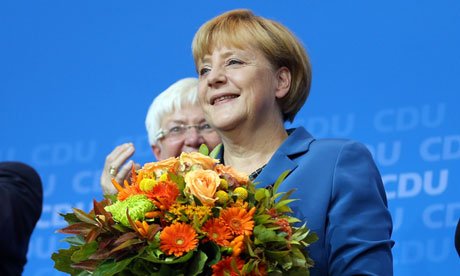
Angela Merkel has urged her party to celebrate “a super result” after exit polls suggested CDU was set to win a third term
The FDP was beaten by the Green Party (8%) and the former communist Left Party (8.5%), and even, according to exit polls, the new Alternative fuer Deutschland, which advocates withdrawal from the euro currency and took 4.9%, just short of the parliamentary threshold.
There was some speculation on German television that the Christian Democrats (CDU) might even win enough seats for an absolute majority – the first in half a century – if both the FDP and AfD fail to make it into parliament.
Angela Merkel addressed jubilant supporters at CDU headquarters, telling them: “This is a super result.”
“We can celebrate tonight because we have done something fantastic.”
In a reference to coalition building, Angela Merkel said it was “too early to say exactly what we’ll do”.
“We have a clear mandate from voters to form a government,” said Volker Kauder, leader of the CDU’s parliamentary group. The outcome showed that “voters want Angela Merkel to remain chancellor” for a third term, he said.
Angela Merkel has made clear she would be prepared to work with the SPD in a grand coalition, as she did in 2005-2009.
The SPD has been more reluctant to consider linking up with the CDU again. The party leader, Peer Steinbrueck, was finance minister in the previous grand coalition, but has said he would not serve in such a government again.
After the exit polls were released, but before official results were confirmed, Peer Steinbrueck conceded that it would be up to Angela Merkel to decide how to proceed saying: “The ball is in Mrs. Merkel’s court. She has to get herself a majority.”
The SPD would have preferred to enter a coalition with the Green Party, but does not appear to have the votes to do so, and has ruled out a three-way alliance including the Left Party (Die Linke).
Analysts think the SPD will probably agree to a coalition with the CDU.
Turnout appeared to be higher than at the last federal election. At 14:00 it measured 41.4% of eligible voters, compared to 36.1% at the same point in 2009.
[youtube EvyjzRj3gWo]
Germany’s rival parties, CDU and SDP, are in their final day of campaigning ahead of Sunday’s parliamentary elections.
Polls suggest Chancellor Angela Merkel’s Christian Democratic Union (CDU) will win the biggest share of the vote.
But her current coalition partners, the Free Democrats, may not pass the 5% threshold for winning seats in parliament.
If so, Angela Merkel may have to consider a coalition with her main rival Peer Steinbrueck’s Social Democrats (SDP).
Angela Merkel is holding a large rally in Stralsund and Peer Steinbrueck is due to appear at an event in Frankfurt.
Addressing a CDU rally in Hanover on Friday, Angela Merkel asked for votes to continue with her government’s policies into 2017.
“Please vote for the CDU on Sunday, so that we can continue our solid policy for you, for your children, for your families and friends,” she said.
“So that in four years we are able to say that people in 2017 are doing better than they did in 2013; more people have jobs; the euro is more stable, Europe is more stable and we have less debt. This is my goal, ladies and gentlemen, and therefore I ask you for your support.”
Peer Steinbrueck – whose opposition SDP party is trying to deny Angela Merkel a third term – rallied his supporters in the town of Kassel. Peer Steinbrueck has sharpened his attacks on his rival, accusing her of skirting the country’s big challenges.
He touched on the crisis in Syria, saying he did not want German involvement in any military action. But he said peacekeeping could not be ruled out.
“Germany will have to, within its alliances and under the conditions of a mandate, take part in peacekeeping and peace securing measures,” Peer Steinbrueck said.
The Green Party – who may play some part in an eventual governing coalition – held a rally in Berlin. The party’s parliamentary co-chair, Juergen Trittin, criticized Angela Merkel’s government.
“Two parties went into the election campaign saying: <<We will not increase taxes>>. Then they started their term with a 3% VAT increase. Then they ended it with the car trade-in rebate scheme that was environmental, industrial and transport policy madness,” he said.
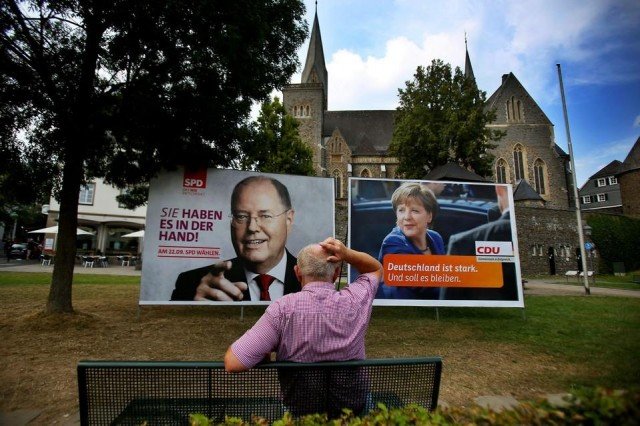
Germany’s rival parties, CDU and SDP, are in their final day of campaigning ahead of Sunday’s parliamentary elections
Angela Merkel’s current coalition partners, the Free Democrats, rallied for votes in Stuttgart.
The Free Democrats (FDP), whose best-known member is Foreign Minister Guido Westerwelle, has seen its fortunes decline sharply since the last election in 2009, when it won nearly 15% of the vote.
Analysts say the party, traditionally more liberal than the CDU/CSU, has struggled to stand out from its more powerful coalition partner on economic policy.
If the Free Democrats (FDP) do badly, as expected, the Christian Democrats (CDU/CSU) may find themselves looking to other small parties to form a broader, more fragile coalition.
According to an average of opinion polls tweeted by the London-based @electionista monitoring site, the CDU/CSU will get 38.6% of the vote to 25.8% for the SPD and 6.4% for the FDP.
Some analysts also see the possibility of a government led by Angela Merkel which includes the Social Democrats, whose leader served as finance minister under Merkel in a previous grand coalition.
Under another scenario, a new party largely formed from disaffected CDU members could get enough votes to be regarded as a different coalition partner. Alternative fuer Deutschland (AfD), as it is known, is avowedly anti-euro and could prove a difficult partner.
In a letter sent to five million households, Angela Merkel, in power since 2005, promised voters they would be in safe hands if she stayed on as chancellor.
“We have achieved a lot together,” she wrote.
“I also want the next four years to be good.”
On Berlin’s famous Alexanderplatz Square on Thursday evening, Peer Steinbrueck likened Angela Merkel to a timid driver steering the country around in circles.
“She likes to drive around roundabouts,” he said.
“That way you don’t hit anything… You drive without accidents.
“But the moment you set a direction, the moment you don’t just administer this country but also decide its political direction, you also cause offence, you provoke. At least with me you know what you get, in contrast to the last four years.”
Dismissing opinion polls, Peer Steinbrueck said: “It’s not the pollsters, nor the wishful thinking of politicians… but you voters who decide.”
The election is one of the most important in years because of Germany’s dominant role in the eurozone.
With the biggest population of any EU state, Germany enjoys a GDP that far outstrips the economies of its partners and is crucial to decisions on tackling the eurozone’s debt crisis.
[youtube JWFLkrmsXTA]
German Chancellor Angela Merkel is an unusually private and reticent politician – there is no exhibitionism and grandstanding.
Even for Germans, Angela Merkel is a hard woman to know.
Angela Dorothea Kasner was born on July 17, 1954, in Hamburg, West Germany. Her father Horst Kasner, a Lutheran pastor, moved the family to Templin, East Germany, in 1954 when Angela was just a few weeks old.
As a politician, Angela Merkel has never been overbearing when it comes to her religious views, but it’s clear that her father’s position in the church had a deep influence on her – creating a powerful moral compass.
Her childhood was also shaped by the Cold War – Angela Merkel’s Socialist father held politically charged gatherings at his seminary and as she grew up, vigorous debates rang around the dinner table. The young Angela had to learn to keep her cards close to her chest for fear of drawing the attention of the Stasi, the secret police.
Being unable to openly express your opinion in East Germany affected people in different ways.
An old school friend of Angela Merkel’s, Hartmut Hohensee, compared it to lapsing into “a sort of paralysis, just hoping winter will pass and the flowers will begin to grow eventually”.
Angela Merkel’s political flowers would begin to grow – but not until 1989, after the Berlin Wall was toppled.
The fall of the Wall produced a maelstrom in German politics. Cafe conversations became street protests; movements became political parties; individuals tried to take control of their country for the first time. It was this world that Angela Merkel decided to enter, aged 35.
Angela Merkel, who has a doctorate in quantum chemistry, stood out from the rest in that political world.
“She didn’t seem to care about her outward appearance at all,” says Lothar de Maiziere, who went on to be East Germany’s last prime minister.
“She looked like a typical GDR scientist, wearing a baggy skirt and Jesus sandals and a cropped haircut.”
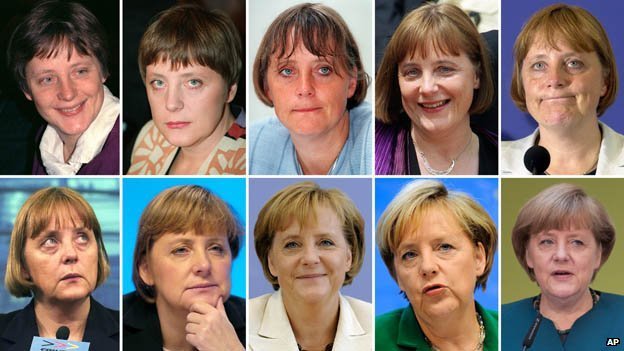
German Chancellor Angela Merkel is an unusually private and reticent politician
To the surprise of many, the East German woman brought up under Communism joined the overwhelmingly male and patriarchal Christian Democrats. In late 1990 Angela Merkel became a member of the Bundestag for the CDU, the largest party in West Germany, and began her rise to the top.
Germany’s Chancellor Helmut Kohl wanted someone female, quiet and a former East German for his first post-reunification cabinet. Lothar de Maiziere recommended Angela Merkel. Beginning as minister for women, she moved slowly up the ranks, becoming minister of the environment.
But in 1999 the quiet girl from Templin stunned everyone. It emerged that Helmut Kohl, who used to call her his “Maedchen” or little girl, had been putting donations into a secret slush fund which he’d used to reward his friends.
Nobody seemed prepared to confront Helmut Kohl but Angela Merkel refused to follow the pack. In a front-page piece in a leading conservative newspaper, she denounced her former mentor and called upon him to resign. It was a stunning act of political patricide and set Angela Merkel on a trajectory towards the top of German politics.
“One of the things people doesn’t always understand about her is she’s… actually a ruthless political operator,” says Jonathan Powell, who got to know her when he was chief of staff to the UK prime minister.
“The way she dealt with all of her rivals in the CDU was extraordinarily Machiavellian from that point of view. She would get rid of them in a switch of an eyebrow.”
Angela Merkel became chair of the CDU in 2000 and Germany’s first woman chancellor five years later.
The defining moment of Angela Merkel’s eight years as leader so far came with the eurozone financial crisis. Greece revealed an enormous – and unmanageable – public debt. And it soon emerged that other countries were in similar dire straits. But as Europe waited to see if Germany would agree to bail out the struggling members of the eurozone or force them to sort out their own problems, Angela Merkel was criticized for reacting too slowly.
Caution and consensus, however, have always been hallmarks of the Merkel machine.
“You can only manage such a crisis if you take a lot of people along the way,” says Ursula von der Leyen, who has worked in every one of Angela Merkel’s cabinets since 2005.
“Angela Merkel always knew where she wanted to end up, but she took time to find a way which everybody could go along with.”
Quite a lot about her story seems to echo Margaret Thatcher’s. Angela Merkel comes from the edges – East Germany, rather than Lincolnshire – and was brought up by an abnormally self-certain and pious father. Something of a loner, she became quite a serious scientist before choosing politics.
Inside her party, Angela Merkel was picked up as a useful female talent by a somewhat patronizing mentor – Kohl, rather than Edward Heath – and surprised everybody by her ruthlessness in ousting him, and eventually taking power herself. Like Margaret Thatcher, Angela Merkel is a ferociously hard worker, excellent on the detail and a wily political operator.
Yet the differences matter much more than the similarities. Coming from her East German background Angela Merkel believes in social solidarity and working with trade unions; in a coalition-based political system, she is a mistress of consensus and, when it suits her, delay.
Angela Merkel has mattered much more to us and the full European story than perhaps we’ve realized.
The results from the imminent German elections can’t be guaranteed but if Angela Merkel is successful, as many have predicted, she’ll have another chance to secure her legacy.
[youtube aAbAOCVbk7U]
German Chancellor Angela Merkel and her poll rival, centre-left Peer Steinbrueck, are due to take part in their only televised election debate.
The event is seen as the Social Democrat (SPD) leader’s biggest chance to claw back Angela Merkel’s lead in the opinion polls before this month’s vote.
Although Angela Merkel’s conservative bloc is expected to win, her coalition partners are faring poorly.
The 90-minute debate starts at 18:30 GMT and will be aired on main channels.
With three weeks to go before the September 22 vote, the two candidates will be grilled by four journalists before an estimated TV audience of up to 20 million.
Peer Steinbrueck will face the first question and Angela Merkel will have the final answer, with each answer limited to 90 seconds.
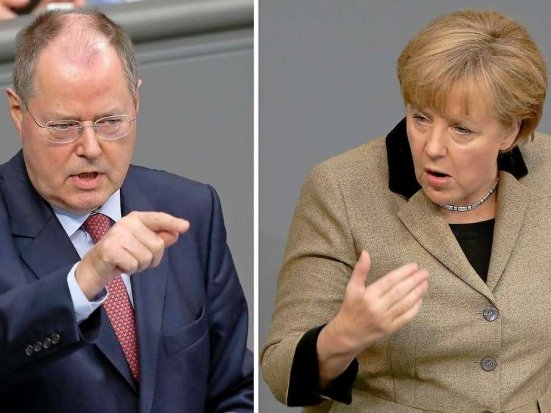
German Chancellor Angela Merkel and her poll rival, centre-left Peer Steinbrueck, are due to take part in their only televised election debate
So far, there have been few campaign issues that have exposed major policy differences between the two figures and the parties have focused on their personalities.
Peer Steinbrueck is often witty but prone to gaffes, while Angela Merkel often seems less than comfortable in the cut and thrust of live debate.
The TV duel may shift enough opinion to alter the election result.
Peer Steinbrueck, 66, served as finance minister under Chancellor Angela Merkel when his SPD party was in a “grand” coalition with her Christian Democrat (CDU) after the 2005 election. But he has refused to enter a similar power-sharing deal.
The pro-business Free Democrats (FDP), currently part of the coalition, are widely expected to perform badly in the polls.
However, an opinion poll on Friday gave Angela Merkel’s conservative bloc 41% of the vote, which might enable her to stay in power with the FDP. Peer Steinbrueck’s Social Democrats were trailing on 26%.
If Peer Steinbrueck does narrow the gap, Angela Merkel, 59, is likely to remain chancellor but the two parties would be forced to consider rebuilding a coalition.
[youtube U0JIbKPSurc]
A German man spent four hours partying alone in his underpants on a military jet used by Angela Merkel.
German authorities are investigating say the 24-year-old entered the cockpit, pushed buttons randomly, deployed an emergency slide, and sprayed a fire extinguisher over the plush interior.
Police tried and failed to persuade the man to leave with a megaphone.
They found a bag with his identity documents and, allegedly, ecstasy and marijuana near the aircraft.
The incident, at Cologne airport on July 25, was brought to a close by a police dog biting the man in the leg.
The suspect, named only as Volkan T, has been taken to a psychiatric institution.
He is reportedly a German bodybuilder of Turkish descent who was not previously known to police.
Berlin-based paper Welt am Sonntag has seen a leaked police log of the incident and claims the document shows “security weaknesses” and “errors” by the air force.
The incident got underway when the local resident, reportedly carrying his bag of drugs and suffering from relationship worries, made his way to the military part of Cologne-Bonn airport.
He got through the gate by saying he was planning a wedding at the officers’ mess and wanted to look at the building again.

The man spent four hours partying alone in his underpants on a military jet used by Angela Merkel
From there the man was able to climb over a barbed wire fence onto the military airfield, undetected by security cameras.
Spotting the government plane, one of two Airbus A319s maintained by the German military for high-ranking politicians’ use, he climbed onto its wing where he proceeded to dance in his underwear.
From there he was able to open the emergency exit door and enter the plane.
The door to the cockpit was open; the man “pressed all the buttons at random,” eventually activating an alarm.
The plane was full of fuel and could have been flown as far as Beijing, the Welt am Sonntag claims, had the intruder had the requisite knowledge.
It was another three hours before the plane was secured, in which time the man allegedly caused around 100,000 euro ($134,000) worth of damage.
The aircraft, used by Chancellor Angela Merkel for official trips, is fitted out in cream and beige with a private office with two VIP seats and a sofa, a conference suite and a further 32 seats for delegations.
It has been repaired and is now back in the service of the nation.
Angela Merkel herself was many miles away at the time, enjoying a performance of The Flying Dutchman at the Bayreuth Festival in Bavaria.
[youtube WDGAp8w4q6s]
 Prev1...234Next
Prev1...234Next  Page 3 of 4
Page 3 of 4

























